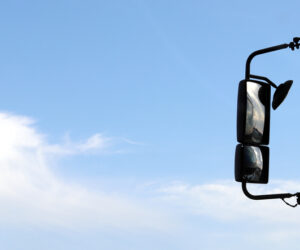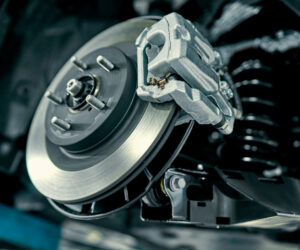Glossary of Trucking Terms
There are a lot of terms in the trucking world. It is as if drivers have their own language. Read on to understand the language of truck drivers.
-
4-Wheeler
This is what we call car drivers. Whether it’s a car, van or pickup – it doesn’t matter. A non-professional vehicle driver is often referred to as a 4-wheeler.
-
Agent
Like a dispatcher but instead, an agent can’t force you to take a load. The good ones realize this and try to act nice – or they beg you to take the load.
-
Bear, Smokey, Full-Grown, Full Grown Bear
Often a bear, smokey, full-grown or full-grown bear is referred to as a state police car.
-
Bear-In-The-Air
This is a police officer in a plane or helicopter.
-
Big Hole, The Big Hole
The top (highest) gear in a truck’s transmission.
-
Jake Brake, Engine Brake
This is a compression brake. When a truck jake brakes – it changes the valve timing in the engine. It feels like when you down-shift in a car, only stronger. -
Jump Seat
A jump seat is the passenger seat.
-
Logbook, Funny book, Comic book, Liar’s book, Log
This is a diary that each driver must keep by law. It covers 24 hours per day, 7 days per week, in 15-minute increments. There are four lines:
- Driving
- On-duty (not driving)
- Sleeper berth
- Off-duty
From the day you’re hired, until you quit, you must keep a logbook. It is a Federal document and has many pages of rules and regulations that a driver must follow.
-
Lumping, Lumpers
Lumping is loading or unloading a trailer by hand. A lumper is someone the driver pays to load or unload a trailer. -
Old hand
An “old hand” is a truck driver that has been around the block many times. He’s wise, generally soft-spoken, doesn’t offer an opinion unless asked for it (unless he believes you or someone else is in immediate danger), and everyone respects him, because he has many years of experience. Sort of a wise elder of trucking. -
Park-N-View, PNV
PNV is a service that many truck stops offer. There is a junction box (or ballard) in the ground next to the parked trucks. The provided hook-ups are for cable TV and a phone line. You can then make local and 800 number calls for free from the cab of your truck. They also provide internet access (ISP). You can pay by the day or by the month. The ISP service can be kind of slow and flaky. -
Placard
Placards are warning signs placed on all four sides of the trailer denoting that the trailer is carrying hazardous materials. Examples are flammable, explosives, and hazardous materials. -
Rambo
This is when someone is getting mouthy on the CB. Usually, they hide behind the mic (doesn’t want to say where he is). -
Ranger Transportation
A company that owner-operators and small fleets lease their equipment to. They provide loads through Agents for drivers to haul. They handle all the legal requirements such as logs, drug testing, safety, driver qualifications, awards, and insurance.
-
Real miles
Real miles are read from the odometer, for the miles drove from the shipper to the consignee. Real miles are not book miles. -
Reefer, Reefer trailer
A Reefer is a refrigerated van type of trailer. It can both cool and heat a trailer.
-
Road-Money
Real money is what we spend while out on the road such as food, smokes, books, daily necessities, and dog food.
-
Rookie
A Rookie is a new truck driver. He is considered a rookie until he stops acting like one. Sometimes this only takes a year or two, some drivers never lose this tag.
-
Scale master, Weighmaster, Chicken coop, Scale, Weigh station
A scale is in place by the law to sure we’re not over gross weight or over axle weight. We call it “checking our ground pressure”. We can also have our truck inspected, and logbooks checked. A Scalemaster is a law enforcement official who runs the scale.
-
Shipper, Pickup
Where you pick up a load.
-
Sleeper, Bunk
The sleeper or bunk is the area behind the driver’s seat and jump seat. Where the bed (bunk), storage, and other stuff is kept. -
Snow chicken
A driver that hates driving in snow and ice. Usually will either park the truck or drive many miles out of the route to avoid the snow. -
Solo
A single driver in a truck. He must stop and rest for eight hours after each ten-hour driving shift.
-
Spot Mirror
Spot mirror is another type of mirror trucks use. There is always at least one on each side below the west coast mirror. These are round, from 4-8 inches in diameter. They are usually convex in shape, and the convexity can vary, depending on where it’s mounted.
-
Spotter
The person standing outside the truck to give the driver another set of eyes when the driver is making tight maneuvers or is backing up.
-
Steer tire, Steers, The Steers
This refers to the first or front set of tires on a tractor. They must be new tires only, recaps are not allowed.
-
Team
Two drivers in one truck. One drives while the other sleeps. -
Throttle, Hammer, The Hammer
What 4-wheelers call the “gas pedal”. Trucks don’t use gas. Phrases like “Put the hammer down.”, “Put the pedal to the metal.”, “Hammer it!”, “Put the hammer down.”, “Both feet on the floor.”, or “Gouge on it!”. Means to give the engine full throttle. -
Tire-Thumper
Anything used to thump the tires. A hammer, a club, a short stick, the sawn-off handle of a baseball bat. -
Tire-Thumping
You can’t tell if the drives or trailers are flat by looking at them. Since they’re duals, one could have air and the other be flat. By hitting the tires with a thumper, you can feel/hear if one is low or flat. Most drivers will notice if a tire is 15lbs low or so. Drivers do an air-pressure check (with a tire gauge) weekly, but often thump the tires whenever stopped.
-
Townie
A “normal” person with a regular job is a townie. Someone who goes home every night after their loads are completed. -
Townie-Job
A truck driver that gets a driving job that lets him go home every day. When he’s off, he can go home. -
Tractor
This is the truck only, without a trailer attached. It may be used to describe something on the truck, but not on the trailer. -
Trailer Tire, Trailers
This refers to the tires on the trailer. They can be new or recap tires. -
Triples, Trips, Set of Trips
Typically a two axle (one drive axle) tractor with three 27 foot trailers. Each trailer usually has one axle. -
Rolley-Valve, Johnson-Stick, Johnson-Valve, Trailer Brake
A valve with a handle that is mounted to the steering column (or on the dashboard) that can be used to engage the trailer brakes by themselves. -
Truck Gross
What amount the truck earns after the company gets their cut of the gross. -
VBR, Violation of the Basic Rule, Speeding
A speeding ticket. -
Water-Level
As in “make the trailer water-level”. This means to distribute the weight evenly from front to back. If you picture a teeter-totter – this is the same idea. -
West Coast Mirror
Every truck has two west coast mirrors. You might think of them as “side view mirrors”. Trucks generally have more than one mirror on each side. A west coast mirror is rectangular in size, about 14 inches tall, and about 7 inches wide. -
Wheelbase
Measurement in inches from the center of the front axle to the center between the two rear axles. -
Willie-Weaver, Willy-Weaver
A person who is driving while drunk, or falling asleep while driving. -
Yard, The Yard
A person who is driving while drunk, or falling asleep while driving. -
Yard Goat
A two-axle truck with a very short wheelbase without a sleeper, designed solely to move trucks around in a yard, easy to get into and out of, with special equipment to make his job easier.


 As the saying goes, if you are unable to see the truck mirrors, the truck driver cannot see you. When a big rig cannot see you, th...
As the saying goes, if you are unable to see the truck mirrors, the truck driver cannot see you. When a big rig cannot see you, th...

